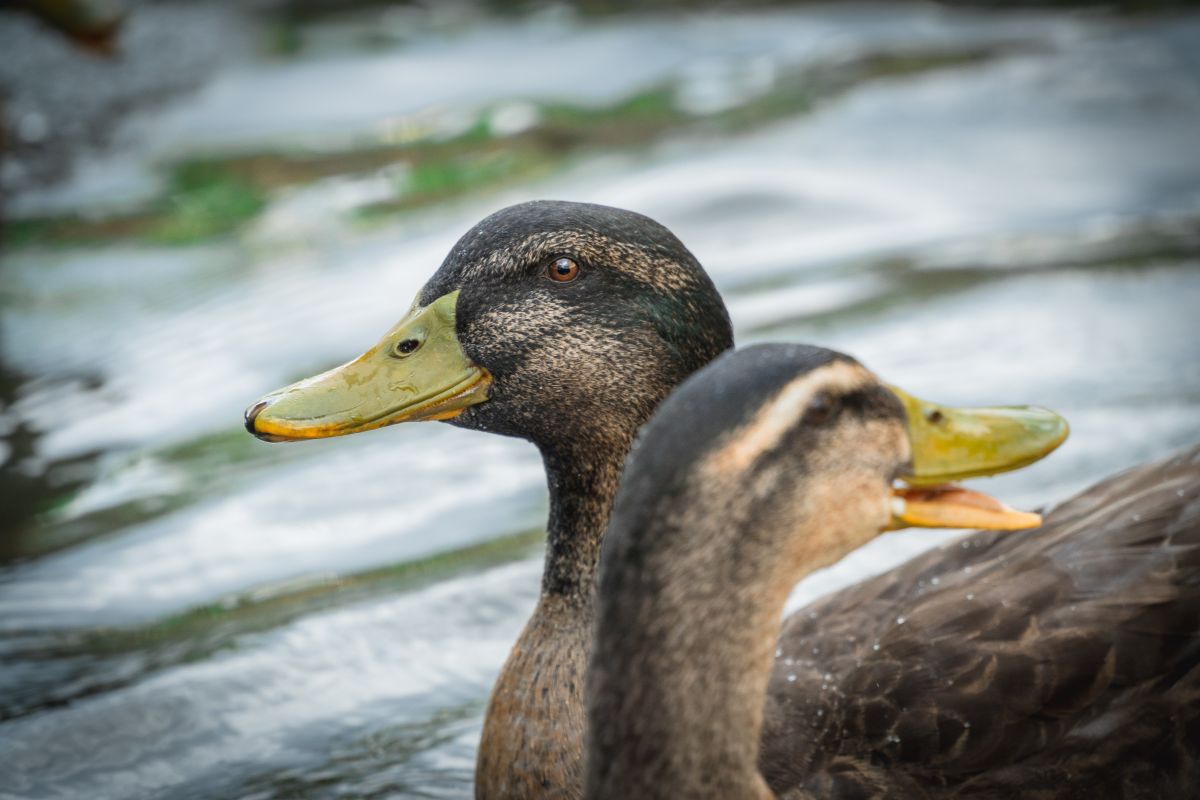Ducks have been common in ponds, rivers, and wetlands for centuries. Their diet, however, is still a matter of debate. Do ducks eat worms? This article will explore the role of worms in a duck’s diet, how ducks find their food, the importance of nutrition for ducks, and more.
Additionally, we will investigate the impact of seasonal changes on a duck’s food intake and the myth that ducks eat only worms. Finally, we will look at diversifying a duck’s diet beyond worms.
Key Takeaways
- Worms are an important part of a duck’s diet, providing protein and essential nutrients.
- Ducks use sight and smell to locate food sources, including worms.
The availability of worms influences ducks’ diet, especially during the breeding season. - Habitat and seasonal changes affect a duck’s diet, with marshy areas providing more worms and aquatic insects and winter months including more insects and small animals.
Myth or Fact: Do Ducks Eat Only Worms
It is a common misconception that ducks only eat worms when in reality, they have a varied diet heavily dependent on seasonal changes.
Ducks can be found socializing in flocks, migrating long distances, and adapting their behavior as their population changes.
During the summer months, ducks eat various insects, larvae, and aquatic plants, while during the winter months, ducks will eat seeds, grains, and waste grain left behind by predators.
Ducks also feed on worms, but they are only one of their food sources. While worms can be found all year round, ducks prefer to eat them in the spring and summer when their food sources are more abundant.
Understanding the Diet of Ducks
Ducks are known for their omnivorous diet, which includes worms. Foraging behaviors of ducks vary by species but typically involve the consumption of both aquatic and terrestrial invertebrates, including worms. Along with worms, ducks also consume aquatic plants, fish, and other small animals.
Duck migration also plays a role in their diet, as different species may travel to different climates at different times of the year to gain access to different food sources. Duck digestion is vital to their nutrition, as they have a unique digestive system that helps them process various foods.
In addition, ducks may supplement their diet with other sources of nutrition, such as insects, small mammals, amphibians, and crustaceans. Understanding ducks’ diet is essential for providing them with the nutrition for a healthy life.
The Role of Worms in a Duck’s Diet
Worms are an important component of a duck’s diet. Research into waterfowl nutrition has shown that ducks often forage for worms in wetlands, especially during the breeding season. Worms provide a nutritious source of protein as well as other essential nutrients.
In addition, their soft texture makes them an ideal food for ducks, who have a unique digestive system and food preferences. Ducks can also adapt their foraging behavior to different environments, so worms’ availability can influence their diet.
Overall, worms are essential to ducks’ diet and are a crucial component of their nutritional needs.
How Ducks Find Their Food
Ducks can forage for their food in various environments, relying on their keen senses to locate the right foods. Ducks use their sense of sight and smell to identify their food sources, which often include water sources such as ponds, streams, and lakes.
Depending on the species of duck, dietary preferences can vary greatly. Some ducks prefer aquatic invertebrates, such as worms, while others prefer seeds, aquatic plants, and insects.
Additionally, ducks will often migrate to a new area when food sources become scarce or to take advantage of seasonal food sources.
The Importance of Nutrition for Ducks
Nutrition is essential for ducks to remain healthy and sustain their energy levels.
Ducks forage for food in various ways, including searching water sources, grazing in open fields, and scavenging for food.
A duck’s diet may vary depending on the food availability and the season. They may eat insects, aquatic plants, small fish, and worms.
Eating habits also vary among ducks; some species are more likely to forage during the day, while others may feed at night or during the twilight hours.
Variety in a duck’s diet is essential to ensure a balanced diet.
Combining foraging and scavenging allows ducks to obtain the full range of vitamins and nutrients they need to stay healthy and active.
How a Duck’s Habitat Influences Their Diet
The habitat of a duck is a significant factor in determining what they can eat. Ducks typically forage in shallow waters, with their diet consisting of small insects, fish, mollusks, and plant material.
They are living in marshy areas will likely consume more aquatic insects, such as worms. Ducks may access a wider variety of food sources in areas with more significant water sources, such as fish. They may also be more likely to feed on plant material in these larger water sources.
Natural predators in the area can also affect a duck’s foraging habits, as they may need to take cover or seek out food sources in safer areas. Additionally, the availability of food sources and the feeding styles of different species of ducks can influence what they eat.
In all, the habitat of a duck plays a major role in what they consume.
The Impact of Seasonal Changes on a Duck’s Food Intake
Seasonal changes can significantly affect a duck’s food intake, with different food sources being available over the year. This can be seen in the changes in a duck’s feeding habits, which can be affected by their migration patterns and the availability of food sources.
During the warmer months, ducks are more likely to consume a plant-based diet, as vegetation is more plentiful. However, in winter, ducks may shift their diet to include more insects and other small animals. Also, ducks may consume more water during the colder months to stay hydrated.
As such, seasonal changes can significantly impact a duck’s food intake, and it is crucial to recognize the different food sources available over the course of the year.
Diversifying a Duck’s Diet: Beyond Worms
Ducks have a varied diet beyond worms, relying heavily on seasonal changes for food sources. Ducks are adept foragers, able to identify and consume various food sources. In addition to worms, they extensively forage for aquatic vegetation, insects, and other invertebrates.
In the summer, ducks may feed on various grasses and other terrestrial plants, while they rely primarily on aquatic food sources in the winter. Their diet is rarely limited to one type of food, as ducks are highly adaptable and can identify various food sources.
Ducks also hunt insects, which can provide a crucial source of protein. To ensure a healthy and varied diet, ducks must be able to identify and forage for various food sources. This includes both aquatic and terrestrial plants, as well as hunting for insects.
Frequently Asked Questions
What Type of Worms Do Ducks Prefer to Eat?
Finding worms is an essential part of the diet of ducks. The type of worms they prefer to eat can vary regionally. Ducks can be observed foraging in the mud and shallow water to find worms. The abundance of worms in these areas can determine their dietary choices.
In addition to worms, ducks may supplement their diets with small fish, insects, and other aquatic creatures. Depending on the region, the worm species ducks prefer to eat may vary. Common choices include earthworms, bloodworms, and tubifex worms.
Understanding duck behavior and the regional diets of ducks can help identify the worms they are likely to consume.
What Are the Physical Characteristics of a Duck’s Digestive System?
The physical characteristics of a duck’s digestive system are pretty fascinating. Ducks have a gizzard made up of a thick muscular wall and small stones that aid digestion. This helps them break down the food they consume, such as worms, even when they migrate.
Ducks also have a unique habitat selection, as they prefer shallow waters and marshes to forage for food. Their excretory habits are also quite interesting, as they tend to defecate in the same area they feed. This helps them to maintain their foraging behavior in the same place.
All of these physical characteristics make ducks an exciting species to study.
How Does a Duck’s Diet Compare to That of Other Waterfowl?
Ducks, like other waterfowl, have adapted to forage for food in various habitats. They have an omnivorous diet, consuming a variety of plant and animal matter, such as aquatic plants, insects, larvae, small fish, and other marine animals.
Ducks have also adapted to their diet by having a bill well adapted to their foraging habits, enabling them to hunt and feed on different food sources. Additionally, their digestive systems have adapted to break down the food they consume efficiently.
Depending on the species, ducks may consume more or less of different food sources, but the overall diet of ducks and other waterfowl is very similar.
What Is the Nutritional Value of Worms for Ducks?
Satire aside, it’s no secret that worms are a common food item in ducks’ diet. However, what is less known is the nutritional value of worms for ducks.
Worms, particularly bee larvae, provide a rich source of essential nutrients for ducks, including proteins, fats, carbohydrates, and minerals. Additionally, the anatomical structure of worms makes them easily digestible for ducks, which makes them an ideal food source.
Furthermore, ducks can safely consume worms, provided safety precautions are taken to ensure that the worms are free from contaminants.
Worms are a beneficial food item for ducks, providing nutritional benefits and aiding in their overall feeding habits.
Are There Any Risks Associated With Overfeeding Ducks Worms?
Overfeeding ducks worms can lead to risky behaviors and food choices that do not meet the bird’s nutrition needs. Worms are a high-protein food source, but a diet that is too high in protein can cause digestive health issues for ducks. Modifications to a duck’s diet need to be made if worms are to be used as a food source, and it is important to monitor the amount of worms consumed by a duck.
Too many worms can result in nutritional deficiencies, leading to health issues. It is best to feed ducks worms in moderation to ensure they get the nutrients they need while avoiding any associated risks.
Conclusion
Ducks have diverse diets and can find nutrition from various sources, depending on their habitat and the season. Worms are one of the many foods that ducks may eat, depending on the availability of other food sources.
Although they have been popularly associated with worms, ducks can exist without them and can benefit from diversifying their diets to include other sources of nutrition.
Symbols such as water and birds can help illustrate the importance of maintaining a balanced diet for ducks.

